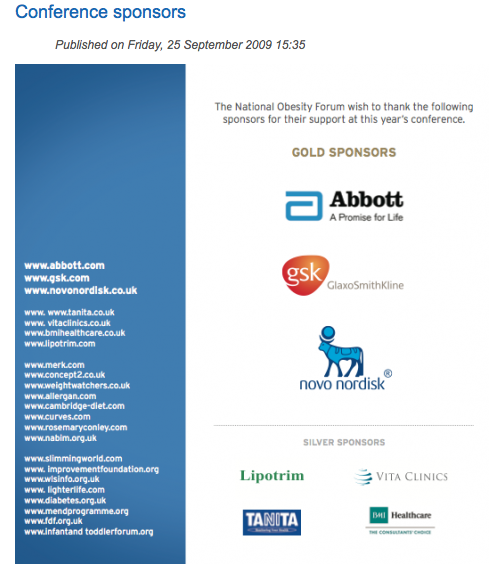The National Obesity Forum is a charity dedicated, it claims, to raising awareness about the hazards of obesity and produce guidelines regarding its management. When one hears the name ‘National Obesity Forum’ and learns it was started by health professionals, it’s natural to imagine that this organisation is an independent body with genuine concerns about health at heart. While the top brass in the National Obesity Forum (NOF) may indeed be well meaning, the organisation is most certainly not independent. Below are screenshots of the NOF’s partners, as well as those who have funded its website and conferences:
Being in bed financially with companies who have supposed obesity solutions to sell represents a major conflict of interest. On the plus side, though, at least the NOF is transparent about the companies that fund it. Except that if this story is to believed, that’s not entirely the case.
Apparently, the NOF recently accepted £50,000 from Coca Cola to promote the value of artificial sweeteners in weight control. What is even more troubling about this is that the deal was allegedly brokered by NOF trustee Tam Fry, who a year ago was sharply critical of the British Government’s quite cosy relationship with food companies.
A major point of this post, though, is to review the evidence (or, rather, lack of it) supporting the use of artificial sweeteners for weight control.
Artificial sweeteners such as aspartame, sucralose and saccharin offer sweetness with little or no calories, and would seem the obvious choice over sugar for those seeking to lose weight. However, to know for sure if artificial sweeteners have weight loss benefits, they would need to be subjected to what are known as ‘randomised controlled’ trials. These trials, often used to assess pharmaceuticals, are generally regarded as the gold standard trials for determining something’s effectiveness. Bearing in mind how much faith we’re asked to put in artificial sweeteners, one would imagine there’s plenty of evidence to support them.
Curiously, not one single randomised controlled trial assessing effects of artificial sweeteners on weight is to be found in the scientific literature.
One explanation for this is that such studies have not been done. Another is that such studies have been done, but have not been published. The practice of publishing welcome results, but ‘binning’ those that are not, leads to what is known as ‘publication bias’. This practice can give a very skewed version of reality. It’s hard to gauge whether publication bias has taken place in this area, but there’s a lot of money in artificial sweeteners, and it seems unlikely that one or more manufacturer would not seek evidence to prove their presumed benefits as weight loss aids.
Also, there is some evidence, albeit in animals, that suggests artificial sweeteners might actually contribute to obesity. In one study, rats were fed with either saccharin or sugar-sweetened yoghurt in conjunction with their normal diet [1]. Compared to those eating sugar-sweetened yoghurt, the rats eating saccharin-laced yoghurt consumed more calories and got fatter too. The authors of this study concluded that, “…using artificial sweeteners in rats resulted in increased caloric intake, increased body weight, and increased adiposity [fatness]”, adding that “These results suggest that consumption of products containing artificial sweeteners may lead to increased body weight and obesity by interfering with fundamental homeostatic, physiological processes”.
One potential explanation for this phenomenon relates to the ability of artificial sweeteners to stimulate the appetite. There is some evidence, for instance, that artificial sweeteners might do this through effects on the brain. In one study, women were given a solution containing either the artificial sweetener sucralose or sucrose (table sugar) [2]. The women were unable to distinguish the source of the sweetness on the basis of taste. However, it seems their brain knew the difference: sugar activated ‘pleasure centres’ in the brain more than sucralose. It seems an artificial sweetener may simply not give the level of pleasure and satisfaction derived from sugar. This, in theory, could lead individuals to seek satisfaction from other foods (i.e. eat more).
Some evidence shows that artificial sweeteners have the ability to stimulate the appetite. For example, one study found that women given saccharin-sweetened lemonade were found to consume considerably more calories overall compared to those drinking regular (sugary) lemonade [3]. In another study, experimenters found that subjects who had eaten yoghurt sweetened with saccharin were inclined to eat more than those who had eaten yoghurt sweetened with sugar [4]. There is other evidence which suggests that aspartame, too, has the capacity to stimulate the appetite [5]. Sugar-sweetened foods are far from ideal, but it does seem that artificially-sweetened ones are simply not a good alternative.
One other issue that I have with artificial sweeteners, even supposedly healthier and more natural ones such as stevia and xylitol, is that they perpetuate the expectation and ‘need’ for very sweet tastes. That’s a dependence I encourage people to lose.
As for the NOF, they could do with some independence too. How does this body hope to be taken seriously if it takes sneaky back-handers from industry to proomote ‘solutions’ with no proven benefit?
References:
- Swithers SE, et al. A role for sweet taste: Calorie predictive relations in energy regulation by rats. Behavioral Neuroscience. 2008;122(1):161-173
- Frank GK, et al. Sucrose activates human taste pathways differently from artificial sweetener. Neuroimage 2008;39(4):1559-69
- Rogers PJ, et al. Separating the actions of sweetness and calories: effects of saccharin and carbohydrates on hunger and food intake in human subjects. Physiol Behav 1989;45:1093–99
- Lavin JH, et al. The Effect of Sucrose- and Aspartame-Sweetened Drinks on Energy Intake, Hunger and Food Choice of Female, Moderately Restrained Eaters. International Journal of Obesity 1997;21:37-42
- Tordoff MG, et al. Oral stimulation with aspartame increases hunger Physiol Behav 1990;47:555–59


